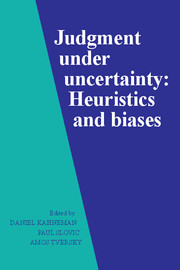Book contents
- Frontmatter
- Contents
- List of contributors
- Preface
- Part I Introduction
- Part II Representativeness
- 2 Belief in the law of small numbers
- 3 Subjective probability: A judgment of representativeness
- 4 On the psychology of prediction
- 5 Studies of representativeness
- 6 Judgments of and by representativeness
- Part III Causality and attribution
- Part IV Availability
- Part V Covariation and control
- Part VI Overconfidence
- Part VII Multistage evaluation
- Part VIII Corrective procedures
- Part IX Risk perception
- Part X Postscript
- References
- Index
6 - Judgments of and by representativeness
Published online by Cambridge University Press: 05 May 2013
- Frontmatter
- Contents
- List of contributors
- Preface
- Part I Introduction
- Part II Representativeness
- 2 Belief in the law of small numbers
- 3 Subjective probability: A judgment of representativeness
- 4 On the psychology of prediction
- 5 Studies of representativeness
- 6 Judgments of and by representativeness
- Part III Causality and attribution
- Part IV Availability
- Part V Covariation and control
- Part VI Overconfidence
- Part VII Multistage evaluation
- Part VIII Corrective procedures
- Part IX Risk perception
- Part X Postscript
- References
- Index
Summary
Several years ago, we presented an analysis of judgment under uncertainty that related subjective probabilities and intuitive predictions to expectations and impressions about representativeness. Two distinct hypotheses incorporated this concept: (i) people expect samples to be highly similar to their parent population and also to represent the randomness of the sampling process (Tversky & Kahneman, 1971, 2; 1974, 1); (ii) people often rely on representativeness as a heuristic for judgment and prediction (Kahneman & Tversky, 1972b, 3; 1973, 4).
The first hypothesis was advanced to explain the common belief that chance processes are self-correcting, the exaggerated faith in the stability of results observed in small samples, the gambler's fallacy, and related biases in judgments of randomness. We proposed that the lay conception of chance incorporates a belief in the law of small numbers, according to which even small samples are highly representative of their parent populations (Tversky & Kahneman, 1971, 2). A similar hypothesis could also explain the common tendency to exaggerate the consistency and the predictive value of personality traits (Mischel, 1979) and to overestimate the correlations between similar variables (see Chap. 15) and behaviors (Shweder & D'Andrade, 1980). People appear to believe in a hologram-like model of personality in which any fragment of behavior represents the actor's true character (Kahneman & Tversky, 1973, 4).
- Type
- Chapter
- Information
- Judgment under UncertaintyHeuristics and Biases, pp. 84 - 98Publisher: Cambridge University PressPrint publication year: 1982
- 233
- Cited by



